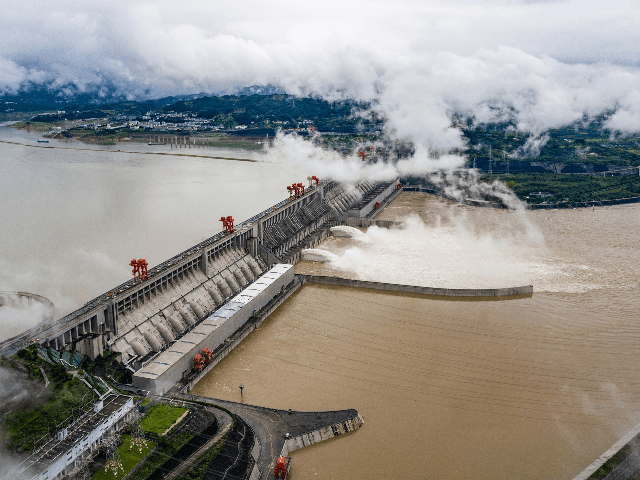Chinese state media announced on Sunday that it blasted holes in the Chuhe River dam in order to “alleviate the pressure of flood control” at the massive Three Gorges Dam, which is straining under the pressure from flooding of the mighty Yangtze River.
While Chinese media strove to portray the controlled demolition of the lesser dam as routine and the situation at Three Gorges as completely under control, outside observers are worried the gigantic Three Gorges Dam – the largest hydroelectric power plant in the world – will be unable to contain the pressure from floods that have killed hundreds of people. If the Three Gorges Dam fails, an unprecedented humanitarian and economic catastrophe could result.
Forbes on Sunday reported that Three Gorges is “buckling under the strain of massive flows of water” from a number of other dams on tributary rivers at higher elevations as higher-than-normal rainfall produces what some in China describe as the worst flooding in a century. Over 400 of the Yangtze River’s many tributaries are overflowing, the floods have killed almost 200 people, and projected economic damage stands at over $12 billion dollars.
The Chinese regime reported another 14 dead in flooding upstream of the Three Gorges Dam over the weekend, while rising floodwaters and landslides forced the evacuation of over 20,000 more people and destruction of over a thousand homes. The total number of people the floods displaced during this monsoon season is approaching 2 million.
All of those problems will grow exponentially worse if the Three Gorges Dam cracks. Chinese troops and disaster relief personnel have been racing to contain the smaller floods leading into the Yangtze, with fingers crossed that rainfall will begin abating this week. At least one more major surge of river water is expected to hit the dam in the next few days.
Chinese media strove to portray the demolition of the lesser dam on the Chuhe River in Anhui province as a routine procedure, but Forbes cited some reports that the dam was “blown to bits with explosives” rather than being poked with a few holes to relieve some water pressure.
Taiwan News noted that widespread demolition of dams and embankments is a flood control tactic the Chinese have not resorted to since 1998. Judging by Chinese state media accounts, the tactic appears to have worked, because the level of flood water hitting the Three Gorges Dam dropped by about 25 percent on Sunday, allowing the water to pass through the dam’s discharge system “smoothly.”
China’s Global Times claimed the Three Gorges Dam “has largely eased flood prevention pressure in the middle and lower reaches of the Yangtze River,” providing vital relief to areas that would otherwise experience “intensive” flooding.
The Global Times disputed foreign observers who worried that Three Gorges is not up to the task of holding back such a massive amount of floodwater, accusing them of harboring anti-Chinese bias and nefarious political motivations:
The Three Gorges project has come into the spotlight recently. A Tuesday report from Reuters quoted a geographer as saying that “the Three Gorges Dam reservoir does not have the capacity to significantly affect the most severe floods.”
However, the Three Gorges project’s duty of flood prevention is mostly based in the Chenglingji region, which is located at the exit of Dongting Lake. With a reservoir capacity for floodwater at 22 billion cubic meters, it is designed to prevent huge floods in the upper stream of the Yangtze River with the Three Gorges Dam working significantly to prevent such a situation spiraling out of control, the Three Gorges Dam Corporation said in the statement.
If flooding occurred via heavy rainfall in the middle and lower reaches of the Yangtze River, the cities surrounding these reaches would have to mainly rely on their own flood drainage facilities. Under such circumstances, the Three Gorges Dam can still make a contribution by retaining and impounding water to ease the pressure on those cities.
Exaggerating the Three Gorges Dam’s “distortion” has also been somewhat of a cliché for certain overseas media outlets. In response to this cliché, the statement from the company noted that currently, the Three Gorges Dam is running safely in a good condition. During the past few years, there has been no so-called distortion occurring, or any other noteworthy risks.
Taiwan News noted that satellite photography showed Three Gorges discharging huge amounts of floodwater five days before the Chinese government officially admitted that emergency procedures were being implemented at the dam. Some residents of the area beneath the dam believe their government caused damaging floods by opening the floodgates of the dam, a step the authorities would not have taken unless they were seriously concerned about structural damage to the massive hydroelectric facility.
The Chinese government has dismissed decades of concerns from foreign analysts about the structural integrity of the Three Gorges Dam and its environmental impact. Some outside analysts fear the government cut corners during the construction of the facility because a good deal of its $26 billion budget was siphoned away by corruption, while local residents brave enough to speak out against the dam believe the Chinese Communist Party sees it as an indispensable “show project” that cannot be allowed to fail, so officials will force the local populace to pay any price needed to conceal severe structural problems.

COMMENTS
Please let us know if you're having issues with commenting.